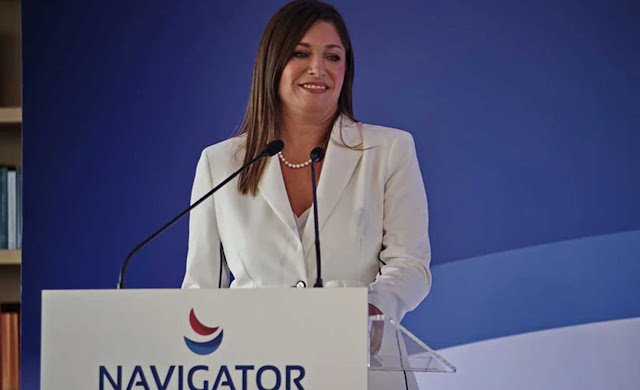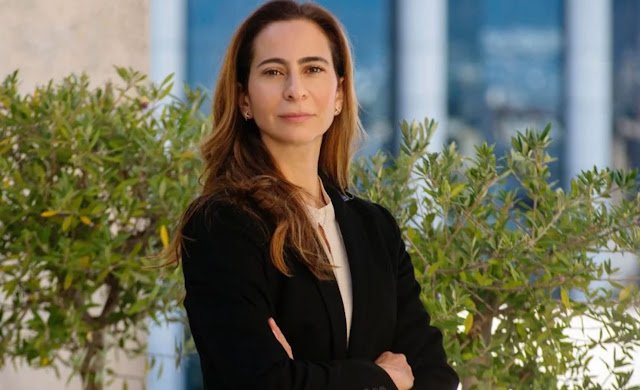| Danae Bezantakou, CEO – NAVIGATOR SHIPPING CONSULTANTS |
The shipping industry is navigating a transformative era marked by several challenges, including decarbonization imperatives, the rise of digital technologies, geopolitical tensions, labor shortages, and strict environmental regulations. In order to maintain resilience and foster meaningful change, it is crucial for shipping companies to adopt a comprehensive and strategic approach.
Decarbonization Initiatives
One of the primary challenges facing the shipping industry is the imperative to reduce carbon emissions. To tackle this, companies must invest in sustainable practices, embracing alternative fuels (biofuels, hydrogen), incorporating energy-efficient vessel designs, and integrating renewable energy sources (solar, wind power). Staying at the forefront of green technologies and collaborating with industry partners to share insights can accelerate the sector’s transition towards decarbonization.
Despite contributing to about 2.5% of environmental pollution, the shipping industry’s control over 90% of global trade underscores its indispensability. However, this prominence necessitates a heightened responsibility to embrace innovative solutions. An essential facet of this transition involves leveraging digitalization to monitor and control vessels remotely from onshore offices, enhancing operational efficiency, and contributing to minimizing the environmental impact by optimizing routes and fuel consumption.
Digitalization for Operational Efficiency
Digitalization is a key driver for operational efficiency in the maritime sector. Integrating advanced technologies such as data analytics and blockchain can significantly enhance various aspects of shipping operations. Predictive analytics can optimize routes, reducing fuel consumption and emissions. Investing in cybersecurity measures concurrently is essential to safeguard sensitive data and ensure the resilience of digital infrastructure.
Geopolitical Navigation
Geopolitical tensions significantly affect shipping, necessitating companies to stay informed on global developments. This involves monitoring international relations, trade policies, and potential disruptions. Mitigating risks includes diversifying routes, forming flexible partnerships, and strengthening inter-country relations for operational adaptability amid political changes.
Showcasing impressive statistics for Greek & European shipping’s global impact.
– 195 countries worldwide, that control 90% of global trade
– 15 countries own 80% world fleet
– 3 countries own 42% of world fleet
– Greece, a country that makes up only 0.15% of the world’s population, commands:
o 5,514 VESSELS
o 441 MIL DWT
o 21% OF THE WORLD’S FLEET IN DWT
o 59% OF THE EUROPEAN FLEET IN DWT
Addressing Labor Shortages
Labor shortages in shipping hinder operational continuity. To address this, fostering a positive work environment and investing in employee training are crucial. Both employees and management should engage in training to adapt to industry changes. Creating a culture that values its workforce helps attract and retain skilled personnel. Exploring automation and technology can supplement human labor, enhancing efficiency.
Given the escalating global population and heightened cargo demands, the industry faces the critical task of securing an ample workforce. Noteworthy demographic shifts, such as the projected global population of 10 billion by the end of the 21st century, underscore the urgency of proactive measures.
With Europe’s declining population share, including Greece’s anticipated decrease by 12% by 2050, (predictions to have the oldest population in the EU by 2030), concerted efforts are necessary to address the current shortage of seafarers. In particular, recognizing the stark decline from 150,000 seafarers in 1990 to 20,000 in 2023 highlights the need for extensive training in new technologies.
Proactively training 800,000 seamen by 2030 becomes paramount to mitigate potential workforce shortages and prevent the displacement of human resources by artificial intelligence. Collaborative initiatives between the EU and Greece can play a pivotal role in shaping a resilient and technologically adept maritime workforce.
Compliance with Environmental Regulations
Stringent environmental regulations, such as emissions standards and ballast water management requirements, necessitate proactive compliance measures. Ensuring vessels meet and exceed these regulations is not just a legal requirement but a commitment to sustainability. Regular audits, monitoring systems, and continuous improvement strategies should be implemented to uphold environmental standards. Engaging with industry associations and regulatory bodies allows companies to actively contribute to shaping pragmatic and effective regulations that align with industry needs.
Collaborative Industry Initiatives
The shipping industry faces complex challenges, requiring collaborative efforts for positive change. Engaging in partnerships, forums, and industry-wide initiatives enables companies to share best practices and innovative solutions. This approach fosters a collective commitment to sustainability, involving not only companies but also academia, politics, and sectors like ports, logistics, and shipyards.
Furthermore, it is essential for entities like the EU to invest in innovation, dedicating resources to address industry challenges. With 500 million euros allocated in the EU, an additional 100 million euros could be earmarked to bring in immigrants to address the workforce needs.
NAVIGATOR FORUM, a significant gathering for the global shipping community, occurring since 2001 on an annual basis, has been pivotal for knowledge exchange and collaboration.
The upcoming 23rd NAVIGATOR in 2024, scheduled from September 20 to 22 in Chios & Oinousses islands, and themed #NavigateBeyondBoundaries promises exploration of new frontiers. The NAVIGATOR ASSEMBLY on March 13, 2024, at Grand Hyatt Athens, themed #ForgeTheFuture, precedes the SHIPPING DECISION MAKERS FORUM, covering key themes like decarbonization, maritime logistics, smart shipping, human performance, ESG, and more.
This forum brings ship owners and the shipping cluster together to translate agreements into action, showcasing a commitment to practical solutions.
Participating in such forums aligns with collaborative industry initiatives, providing an excellent opportunity for shipping companies to contribute, share insights, and collectively shape the future of the industry.
Strategic Planning for Resilience
In the face of uncertainties, strategic planning is crucial. Developing comprehensive contingency plans involves scenario planning, risk assessments, and continuous monitoring of industry trends. Diversifying operations and revenue streams fortifies a company against disruptions, fostering long-term resilience.
As we navigate an experimental future, a unique dilemma arises—the first-time challenge of deciding which vessels to build. This uncertainty extends beyond practical shipbuilding decisions, involving advising the younger generation entering the industry. Thoughtful strategic planning is needed to navigate uncharted territories.
Here I would like to mention statements of Mrs. Melina Travlou, President of the Union of Greek Shipowners, who asserted at COP28 in Dubai, and to which I fully agree: “The global energy transition cannot be achieved without shipping”
“We do not produce energy; we do not trade energy. But we use and transport energy.”
In fostering resilience and commitment to change in the shipping industry, education plays a pivotal role. Platforms like YES Forum integrate young minds into the maritime landscape, contributing to competent executives who will propel our country globally.
YES Forum platform serves as a beacon for open dialogue in Greek Shipping and Sea Tourism, bringing together executives, school and university students, and recent graduates. Held under the auspices of the Ministries of Shipping, Education, Tourism, and the Hellenic Chamber of Shipping, as well as with the endorsement of the majority of Greek Universities, YES Forum strives to contribute to the creation of a skilled workforce that will uphold the industry’s standards.
In the current academic year alone, YES Forum has conducted physical, live presentations to 70 schools, reaching over 10,000 students, also advocating through mentoring programs, open days, and the Youth day at Posidonia. This outreach, officially approved by the Ministry of Education and Religious Affairs and the Institute of Educational Policy, underscores the commitment to empowering the next generation with knowledge about the shipping industry.
Integrating young minds into the maritime sector is not just an investment in the future but a strategic move for industry innovation. Involving students in discussions about decarbonization, digitalization, geopolitical challenges, labor shortages, and environmental regulations fosters a dynamic and forward-thinking mindset. Despite Greek shipping history spanning 2,500 years, the industry faces the challenge of a limited number of seafarers. Active engagement with the youth in discussions and education is crucial for the continuity of the Greek shipping miracle.
Navigating challenges in the shipping industry, such as decarbonization, digitalization, geopolitical tensions, labor shortages, and environmental regulations, requires the involvement of young professionals for fresh perspectives and innovative solutions. YES Forum acts as a crucial bridge, connecting industry leaders with the enthusiasm and creativity of the next generation.
In conclusion, maintaining resilience and commitment to change demands a holistic approach. Companies must address multiple challenges simultaneously, engage in collaborative initiatives, and strategically plan for resilience. Recognizing the pivotal role of education, actively supporting initiatives like Navigator Forum & YES Forum, and integrating young talents into the shipping landscape ensures industry resilience and paves the way for a sustainable maritime future. Collaborative efforts across generations are key to achieving true progress in the shipping industry.















